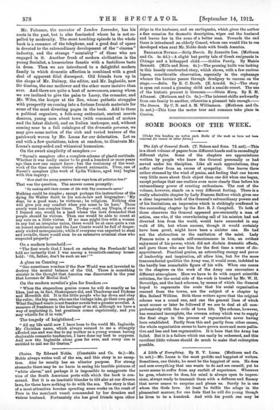SOME BOOKS OF THE WEEK.
[Under this heading we notice such Books of the week as have not boos reserved for review in other forms.)
The Life of General Booth. (T. Nelson and Sons. 7d. net).—This is a short volume of papers from different hands and in exceedingly different styles. Some of the chapters are appreciations written by people who knew the General personally or had served Tinder his discipline. Like all such appreciations, they suffer rather from an excess of sympathy. One leaves them rather stunned by the wind of praise, and feeling that one knows very little more about their object than one did when one began, except perhaps that one realizes even more clearly than before his extraordinary power of creating enthusiasm. The rest of the volume, however, stands on a very different footing. There is a really admirable chapter by Lady Frances Balfour which gives one a clear impression both of the General's extraordinary powers and of his limitations, an impression which is strikingly confirmed in the succeeding chapter by the Rev. R. J. Campbell. To both of these observers the General appeared pre-eminently a man of action, one who, if the overwhelming call of his mission had not diverted him from the world, would have succeeded in any walk of life, but whose success, though it would certainly have been great, might have been a sinister one. He had not the abstraction or the exaltation of the saint. Lady Frances notes a certain self-consciousness in him, an evident enjoyment of his power, which did not disdain dramatic effects, and gave those who saw him for the first time a sense of dis- appointment. Practical genius, an astounding energy and power of leadership and inspiration, all allow him, but for the more transcendental qualities the Army was, it would seem, indebted to the hardly less remarkable figure of his wife. When one comes to the chapters on the work of the Army one encounters a different atmosphere. Here we have to do with expert scientific' criticism, for the social side of the work is treated by Mr. W. H. Beveridge, and the land schemes, by means of which the General hoped to regenerate the souls that his social organization rescued from the towns, are the subject of a chapter by Mrs. Roland Wilkins. Both these writers agree that the original scheme was a sound one, and one the general lines of which must sooner or later be followed if we are to deal at all com- prehensively with the evils of town life. The scheme, however, has remained incomplete, the oversoa colony which was to supply the final stage in the process of regeneration never having been established. Partly from this and partly from other causes, the whole organization seems to have grown more and more pallia- tive and less and less regenerative. It is here that the Army has failed. But it is a failure which can easily be redeemed, and this excellent little volume should do much to make that redemption possible.






































 Previous page
Previous page